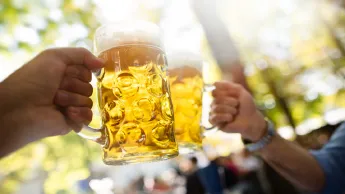The world-famous purity law for German beer of 1516
- 2014-09-23
- Miriam Moser
- Comment

German beer has been brewed in accordance with the purity law for more than 500 years. Using the four ingredients prescribed in this law, German brewers have created a diversity of beers that is unrivalled in the world. Today Germany has over 5,000 different beers.
A German saying loosely translated as ‘Hops and malt for beer, may God preserve them here’ alludes to the basic ingredients used in beer brewing. These ingredients were laid down in the so-called ‘purity law’ in the Bavarian city of Ingolstadt in 1516. The purity law requires that ‘nothing other than barley, hops and water be used’ to produce beer. The importance of yeast was not known at the time and was added later. The purity law initially applied to the Duchy of Bavaria only but was gradually adopted by the German states and has been the law governing beer brewing in all of Germany since 1906.
The art of beer brewing in Germany according to the purity law
Over the centuries, the purity law has spawned a world-renowned brewing art. Today more than 1,300 German breweries use only four natural ingredients to create over 40 different types of beer (Alt, Pils, Kölsch etc.) and some 5,000 individual beer brands such as Veltins, Krombacher und Bitburger – a diversity that is unique in the world. Dr Hans-Georg Eils, president of the German Brewers Federation, and Friedrich Düll, president of the Bavarian Brewers Federation, are convinced that ‘If Germany is still regarded as the undisputed beer nation, that is due to the purity law’.
Deutsche Welle: What is the German Beer Purity Law?
The purity law for German beer is to become a world cultural heritage
Thus, the purity law not only preserves a traditional craft technique, that of beer brewing, but is also regarded as the world's oldest food law that is still in force today.
However, in the opinion of Günter Thömmes, it would be exaggerated to conclude that the purity law was enacted as early as in the 16th century to protect consumers from ingredients that could be hazardous to their health. The brewery owner, who has two degrees in brewing and has travelled the world ‘in beer matters’ for 20 years, commented that
Today, of course, most domestic brewers are proud of the ancient purity law for beer and even want to have it protected as world cultural heritage. The German Brewers Federation has submitted a corresponding application to UNESCO.
Germany is famous for tasty beer
Foreign demand for German beer is high. The main export markets are Italy, France and the Netherlands, but German brewers also see ‘encouraging trends’ in China and the USA. For many people in foreign countries, beer means Germany. And because Germans love their beer so much, they celebrate the day of beer every year on 23 April.
